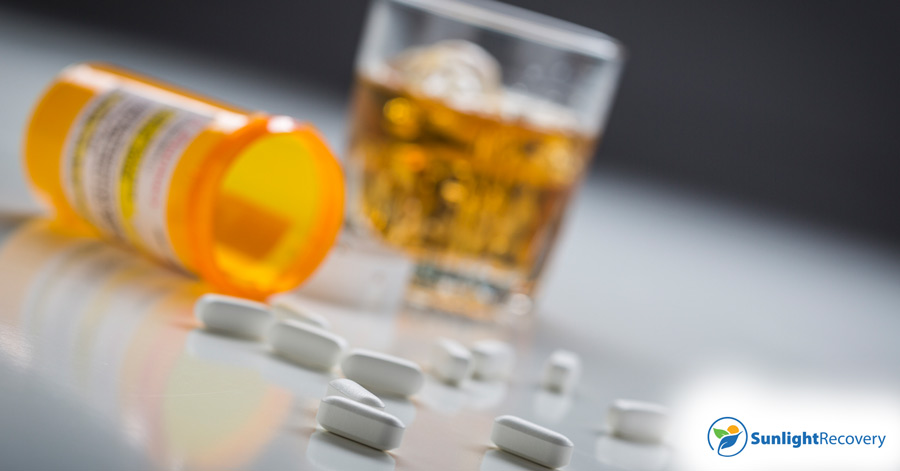Mixing prescription drugs with alcohol can be extremely dangerous or even deadly. When alcohol and pills are combined, they can interact in ways that can increase the effects of both substances, leading to dangerous and potentially life-threatening situations.
One of the main dangers of combining prescription medicines with alcohol is that it can impair your judgment and decision-making abilities. This can lead to risky behavior, such as driving while under the influence, which can result in accidents and injuries. Mixing drugs and alcohol can also increase the risk of overdose, as the combination of the two substances can cause a person to lose consciousness or stop breathing. An NIH study showed that 42% of adults who drink have a history of combining prescription medications with alcohol, even when the drug has a warning label.
In addition to the physical dangers, mixing drugs and alcohol can also have serious mental health consequences, such as increased anxiety, depression and other mental health issues, particularly when paired habitually. For those already taking medications to help with a mental health condition, alcohol can have serious side effects, particularly for those on stimulants.
How Prescription Drugs Affect Us
Prescription drugs are medications that are specifically designed to treat certain health conditions or diseases. They’re prescribed by a health care professional, such as a doctor or nurse practitioner, and are usually taken orally in the form of tablets, capsules or liquids. Prescription drugs can be used to treat a wide range of health conditions, from common colds and allergies to more serious conditions like cancer and heart disease.
When taken as directed by a health care professional, prescription drugs can be very effective at treating or managing certain health conditions. For example, blood pressure medications can help lower high blood pressure, and antidepressants can help reduce symptoms of depression.
However, prescription drugs can also have negative side effects, which can range from mild to severe. These side effects can include things like nausea, dizziness, drowsiness and dry mouth. Some prescription drugs can also interact with other medications, supplements or foods, which can increase the risk of side effects.
In some cases, people may develop an addiction to prescription drugs, particularly if they’re taken for a long period of time or taken in higher doses than prescribed. It’s important to be aware of the potential for addiction and to talk to your health care professional if you have concerns.
How Alcohol Affects Us
Alcohol is a central nervous system depressant that can have a range of effects on the body and brain. When alcohol is consumed, it’s absorbed into the bloodstream and passes quickly to the brain. Here, it can alter the activity of neurotransmitters, or the chemical messengers that transmit signals between brain cells. This can lead to changes in mood, behavior and cognition.
At low to moderate levels of consumption, alcohol can produce feelings of relaxation and mild euphoria. It can also reduce inhibitions, making people more social and talkative. As alcohol levels continue to rise, it can lead to impairments in judgment, coordination and reaction time, making activities such as driving or operating heavy machinery dangerous. At high levels of consumption, alcohol can cause slurred speech, vomiting and unconsciousness.
Long-term, heavy alcohol consumption can have negative effects on physical health. It can increase the risk of liver damage, high blood pressure, pancreatitis and certain types of cancer. Alcohol can also interfere with the absorption and metabolism of essential nutrients, leading to possible deficiencies.
In addition to the physical effects, alcohol can alter mood and lead to feelings of depression and anxiety. Chronic alcohol abuse can increase the risk of developing mental health disorders, such as depression and anxiety disorders.
Interactions When Mixing Prescription Drugs With Alcohol
Combining prescription medications with alcohol can have serious and potentially dangerous consequences. Alcohol can interact with medications in a number of ways, including:
- Enhancing the sedative effects of certain medications. Some medications, such as benzodiazepines and sleep aids, can cause drowsiness. When these medications are taken with alcohol, the sedative effects can be amplified, leading to excessive drowsiness, impaired judgment and even coma or death in severe cases.
- Interfering with the metabolism of medications. Alcohol can interfere with the way the body metabolizes certain medications, leading to higher or lower levels of the medication in the bloodstream than intended. This can cause the medication to be less effective or, in some cases, can lead to overdose or toxic reactions.
- Interacting with the mechanism of action of medications. Alcohol can also interact with the way certain medications work in the body. For example, alcohol can interfere with the blood-thinning effects of anticoagulant medications, such as warfarin, increasing the risk of bleeding.
It’s important to be aware of the potential interactions between alcohol and prescription medications and discuss any concerns with a health care provider. It’s generally recommended to avoid drinking alcohol while taking prescription medications. Sometimes, even small amounts of alcohol can be harmful or increase the risk of side effects.
Some over-the-counter medications and herbal supplements can interact with alcohol in similar ways. It’s always a good idea to discuss the use of any new medications or supplements with a health care provider or pharmacist to ensure that they’re safe to use in combination with alcohol.
When to Seek Help
Combining medicines and alcohol is a high-risk activity. Even seemingly innocuous prescriptions like antibiotics or antihistamines may not mix well with alcohol. If you find that you often grab a drink, even while taking prescription drugs, you should talk to your doctor about potential risk factors and seek help.
High-risk behaviors can be a sign that you need help from a mental health professional. If you feel you can’t stop drinking, even when you know that it’s not a good idea while you’re taking prescription medicine, contact us at Sunlight Recovery. Our counselors can help and are here to listen.






